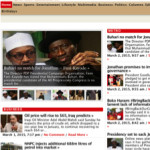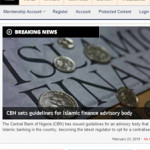Daily Times of Nigeria Nigerian Newspaper is a newspaper with headquarters in Lagos, Nigeria. At its peak, in the 1970s, it was one of the most successful locally owned businesses in Africa. The paper went into decline after it was purchased by the government in 1975. What was left was sold to a private investor in 2004. Operations were suspended in 2007. As of April 2011 the fate of the paper was uncertain, being the subject of various lawsuits.
The Dailytimes Nigeria was incorporated on 6 June 1925 by Richard Barrow, Adeyemo Alakija and others. They printed the first copy as The Nigerian Dailytimes on 1 June 1926. Adeyemo Alakija was an African barrister while the other founders represented European interest groups in the Lagos chamber of commerce.Ernest Ikoli was the first editor and Adeyemo Alakija was Chairman of the Board. Both men became involved with the nationalist Nigerian Youth Movement. Later, Ikoli became a member of the Legislative Council in 1941, while Alakija was appointed to the governor’s Executive Council in 1943.
In the early 1930s the pan-Africanist Dusé Mohamed Ali joined the paper as a journalist at the age of 65. He later moved on to found the influential journal The Comet.The Dailytimes became a popular voice of the nationalist movement. Education was one of the first issues. In a 1934 editorial the paper opposed Native Authority schools, which they saw as controlled by stooges of the colonial administration, and advocated independent mission schools. The first tertiary institute in the colony, Yaba College, opened in January 1934. The Nigerian Dailytimes described it as “a grand idea, and imposing structure, resting on rather weak foundations … we wish to declare emphatically that this country will not be satisfied with an inferior brand [of education] such as the present scheme seems to threaten”.
R. B. Paul, a Liverpool businessman, bought the paper in 1935.[2] When Nnamdi Azikiwe (“Zik”) launched his West African Pilot in 1937, dedicated to fighting for independence from British colonial rule, established papers such as the Nigerian Dailytimes lost a large part of their audience. The Dailytimes responded by raising foreign capital and injecting fresh blood into the editorial team.[4] By the end of World War II in 1945, the Dailytimes was outspokenly hostile towards colonial rule.






